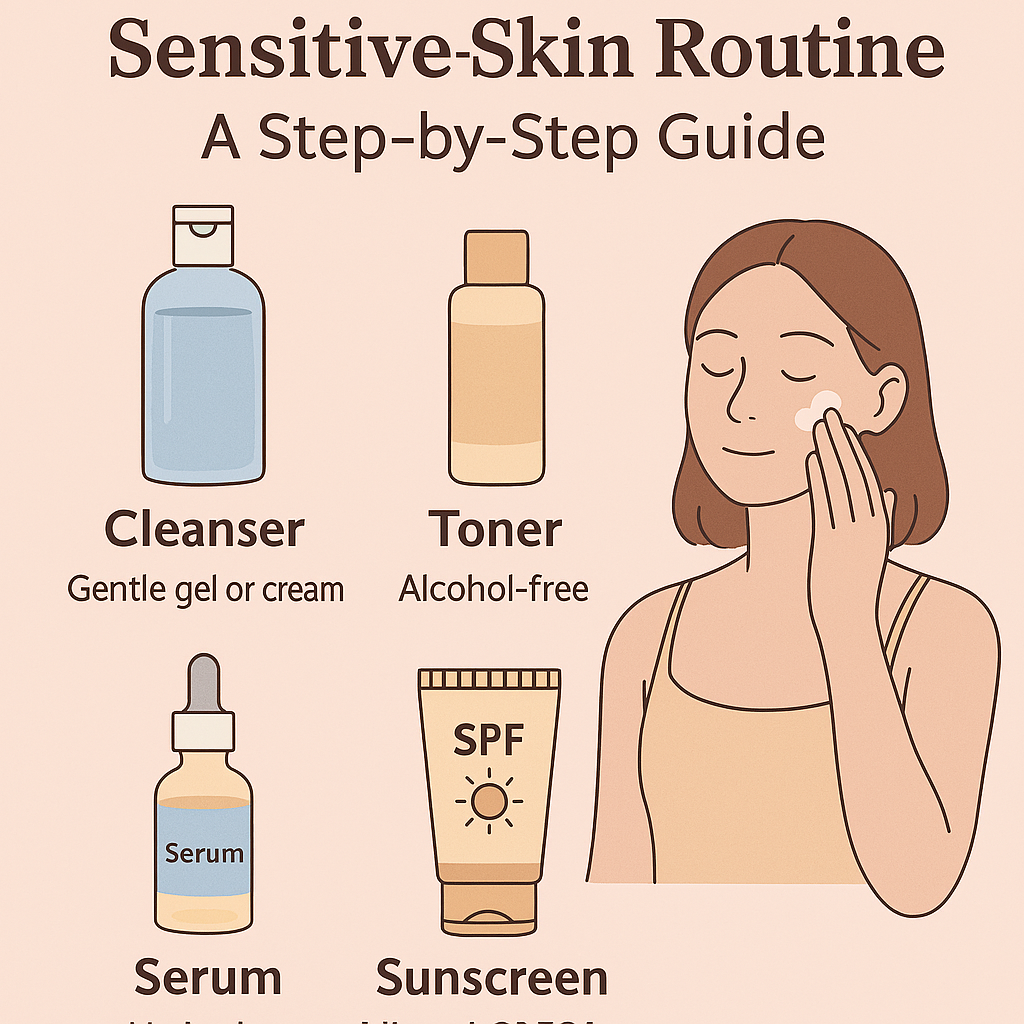Sensitive skin demands a thoughtful, gentle approach that soothes irritation, strengthens the barrier, and delivers lasting comfort. In this comprehensive guide, you’ll learn how to choose the right products, layer them effectively, and adjust your regimen over time.
Understanding Sensitive Skin
Sensitive skin reacts easily to environmental, chemical, and physical triggers. You might experience redness, itching, burning, or tightness even with products that work for others. Common causes include:
- A weakened skin barrier
- Harsh ingredients like fragrances and alcohol
- Temperature swings, pollution, or UV exposure
- Underlying conditions such as rosacea or eczema
Recognizing your personal triggers is the first step toward building a routine that truly calms rather than irritates.
Identify Your Skin Type and Triggers
Before you shop, take time to map out what your skin tolerates—and what it rejects.
- Patch Test
- Apply a dime-sized amount of any new formula on your inner forearm and wait 24–48 hours.
- Bare-Face Test
- Cleanse, wait one hour, then observe dryness, oiliness, or tightness.
- Trigger Diary
- Jot down reactions alongside weather, stress levels, and product changes.
These simple steps help you avoid surprises and eliminate guesswork from your regimen.
Choosing Gentle Cleansers
A cleanser sets the tone for everything that follows. Opt for pH-balanced, soap-free formulas that remove dirt without stripping natural oils.
| Good Ingredients | Avoid |
|---|---|
| Glycerin | Sulfates |
| Ceramides | Synthetic Fragrances |
| Aloe Vera | Denatured Alcohol |
| Chamomile Extract | Harsh Surfactants |
Pro Tip: Gel or cream cleansers tend to be milder on sensitive skin than foaming ones.
Toning and Balancing
After cleansing, a soothing toner can restore pH balance, boost hydration, and prepare skin for serums.
- Look for alcohol-free toners with calming botanicals (rose water, chamomile, witch hazel distillate)
- Avoid acidic exfoliating toners unless your skin has built up tolerance
- Apply with clean hands to reduce micro-abrasions
A well-chosen toner transforms the “dry skin” stage between cleansing and treatment into a boost of comfort.
Hydration and Moisturization
Sensitive skin thrives on a three-step hydration strategy: humectants, emollients, occlusives.
- Humectants
- Hyaluronic acid, glycerin, panthenol
- Emollients
- Squalane, ceramides, phytosterols
- Occlusives
- Shea butter, petrolatum, dimethicone
Layer these from lightest (water-based) to heaviest (oil or cream-based). This sandwich approach locks water in and prevents transepidermal water loss (TEWL).
Sun Protection: A Must-Have
Sunscreen is non-negotiable for sensitive skin. UV damage weakens your barrier and sparks new irritation.
- Choose mineral sunscreens (zinc oxide or titanium dioxide) labeled “for sensitive skin”
- Aim for SPF 30 or higher, broad-spectrum coverage
- Reapply every two hours when you’re outdoors, even on cloudy days
Think of sunscreen as the capstone of your morning routine—it seals in all the care you’ve layered underneath.
Layering Actives Safely
Sensitive skin can still benefit from targeted actives—but introduce them one at a time.
| Active | Benefit | Frequency |
|---|---|---|
| Niacinamide | Reduces redness, strengthens barrier | Daily |
| Vitamin C (Low-Dose) | Antioxidant, brightening | 3× per week |
| Azelaic Acid | Calming, anti-inflammatory | 2–3× per week |
| Retinol (Microencapsulated) | Boosts cell turnover | 1–2× per week |
Always perform a new active patch test. When in doubt, alternate nights between actives and core hydration steps to minimize overload.
Weekly Extras: Gentle Exfoliation & Masks
Even sensitive skin needs a light reset to shed dead cells and maximize absorption.
- Exfoliate with a soft konjac sponge or a gentle enzyme mask once per week
- DIY soothing masks:
• Aloe vera gel + chamomile powder
• Oatmeal paste + honey + a drop of jojoba oil - Skip masks if you notice persistent redness—your barrier is telling you to pause
Track your skin’s response in a journal, and adjust the frequency to what feels calm rather than reactive.
Morning Routine Checklist
- Cleanser (gel or cream)
- Alcohol-free, soothing toner
- Lightweight hydrating serum (hyaluronic acid)
- Moisturizer with ceramides or squalane
- Mineral sunscreen (SPF 30+)
Evening Routine Checklist
- Double-step cleanse (oil-based followed by cream/gel)
- Soothing toner or essence
- Targeted treatment (niacinamide or low-dose vitamin C)
- Richer moisturizer or occlusive sealant
- Optional: Thin layer of overnight mask for a moisture boost
Monitoring and Adjusting Your Routine
Sensitive skin evolves. Factors like seasons, stress, and aging will shift your needs.
- Schedule a routine audit every 4–6 weeks
- Note any new reactions in your trigger diary
- Swap out ingredients gradually if you outgrow a formula
Frequently Asked Questions
Q: Can I use fragrance-free products with essential oils?
A: Essential oils can still irritate. If you’re uncertain, patch-test or avoid them altogether.
Q: Why does my skin feel tight even after moisturizing?
A: Your barrier might be damaged. Scale back actives and lean into occlusive, barrier-repair ingredients like ceramides or shea butter.
Q: Are sheet masks safe for sensitive skin?
A: Yes, if they’re fragrance-free and packed with soothing extracts like aloe, calendula, or centella asiatica.
Building a complete sensitive skin routine is about listening to your skin, choosing the gentlest formulas, and layering products in the right order. Share your wins, ask questions in the comments, and bookmark this guide—because happy skin deserves reliable, long-term care.
